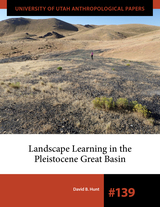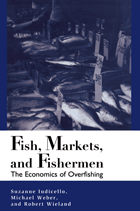
A significant number of the world's ocean fisheries are depleted, and some have collapsed, from overfishing. Although many of the same fishermen who are causing these declines stand to suffer the most from them, they continue to overfish. Why is this happening? What can be done to solve the problem.
The authors of Fish, Markets, and Fishermen argue that the reasons are primarily economic, and that overfishing is an inevitable consequence of the current sets of incentives facing ocean fishermen. This volume illuminates these incentives as they operate both in the aggregate and at the level of day-to-day decision-making by vessel skippers. The authors provide a primer on fish population biology and the economics of fisheries under various access regimes, and use that information in analyzing policies for managing fisheries. The book:
- provides a concise statistical overview of the world's fisheries
- documents the decline of fisheries worldwide
- gives the reader a clear understanding of the economics and population biology of fish
- examines the management issues associated with regulating fisheries
- offers case studies of fisheries under different management regimes
- examines and compares the consequences of various regimes and considers the implications for policy making
The decline of the world's ocean fisheries is of enormous worldwide significance, from both economic and environmental perspectives. This book clearly explains for the nonspecialist the complicated problem of overfishing. It represents a basic resource for fishery managers and others-fishers, policymakers, conservationists, the fish consuming public, students, and researchers-concerned with the dynamics of fisheries and their sustenance.
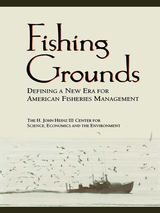
Fisheries management today is highly contentious. The interests of fishers and fish processors, coastal communities, the government, and environmental organizations are often different and can even be mutually incompatible.
Fishing Grounds offers a comprehensive assessment of the legal, social, economic and biological context of marine fisheries management in the United States. Drawing on interviews with stakeholders from all sides of the issue, the authors seek common ground -- and points of unresolved controversy -- among the diversity of interests and viewpoints involved. Chapters examine:
- history and background
- status of marine fisheries
- fishery productivity from biological, social, and economic perspectives
- ownership of fishery resources
- management structures and incentives
- the roles of science and evaluation
Fishing Grounds presents a useful overview of fisheries management options and positions regarding those options, providing valuable insight into the opinions and concerns of stakeholders and the sets of incentives to which those stakeholders respond. It is an important work for fisheries management professionals in industry, government agencies, and nongovernmental organizations, as well as for students and researchers involved with fisheries and fisheries management.

For hundreds of years, the New England cod fishery was one of the most productive in the world, with higher average annual landings than any comparable ocean area. But in the late 1980s, fish catches dropped precipitously, as the cod, flounder, and other species that had long dominated the region seemed to lose their ability to recover from the massive annual harvests. Even today, with fishing sharply restricted, populations have not recovered.
Largely overlooked in this disaster is the intriguing human and scientific puzzle that lies at its heart: an anguished, seemingly inexplicable conflict between government scientists and fishermen over how fish populations are assessed, which has led to bitter disputes and has crippled efforts to agree on catch restrictions. In The Great Gulf, author David Dobbs offers a fascinating and compelling look at both sides of the conflict.
With great immediacy, he describes the history of the fisheries science in this most studied of oceans, and takes the reader on a series of forays over the Gulf of Maine and Georges Bank on both fishing boats and research vessels. He introduces us to the challenges facing John Galbraith, Linda Despres, and Jay Burnett, passionate and dedicated scientists with the National Marine Fisheries Service who spend countless hours working to determine how many fish there really are, and to the dilemma of Dave Goethel, a whipsmart, conscientious fisherman with 20 years's experience who struggles to understand the complex world he works in while maintaining his livelihood in an age of increasing regulation.
Dobbs paints the New England fishery problem in its full human and natural complexity, vividly portraying the vitality of an uncontrollable, ultimately unknowable sea and its strange, frightening, and beautiful creatures on the one hand, and on the other, the smart, irrepressible, unpredictable people who work there with great joy and humor, refusing to surrender to the many reasons for despair or cynicism. For anyone who read Cod or The Perfect Storm, this book offers the next chapter of the story -- how today's fishers and fisheries scientists are grappling with the collapse of this fishery and trying to chart, amid uncertain waters, a course towards its restoration.
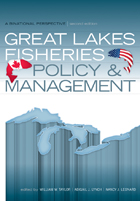
To maintain thriving, sustainable fisheries in the Laurentian Great Lakes, an understanding of the numerous and complex ecological, societal, economic, management, and policy issues surrounding them is critical. This incisive study provides a collaborative, interjurisdictional, and multi-use perspective that is shaped by the United states and Canada together as part of their shared governance of these waters. This book offers an informed look at the Great Lakes fisheries and their ecosystems, as the contributors examine both the threats they have faced and the valuable opportunities they provide for basin citizens and industries. Divided into four sections—the Great Lakes region, Great Lakes Fisheries, Fisheries case studies, and outlook for the Future—this is a valuable and up-to-date tool for students, researchers, policymakers, and managers alike.
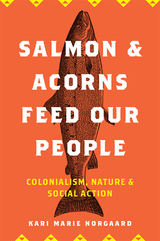
Since time before memory, large numbers of salmon have made their way up and down the Klamath River. Indigenous management enabled the ecological abundance that formed the basis of capitalist wealth across North America. These activities on the landscape continue today, although they are often the site of intense political struggle. Not only has the magnitude of Native American genocide been of remarkable little sociological focus, the fact that this genocide has been coupled with a reorganization of the natural world represents a substantial theoretical void. Whereas much attention has (rightfully) focused on the structuring of capitalism, racism and patriarchy, few sociologists have attended to the ongoing process of North American colonialism. Salmon and Acorns Feed Our People draws upon nearly two decades of examples and insight from Karuk experiences on the Klamath River to illustrate how the ecological dynamics of settler-colonialism are essential for theorizing gender, race and social power today.

READERS
Browse our collection.
PUBLISHERS
See BiblioVault's publisher services.
STUDENT SERVICES
Files for college accessibility offices.
UChicago Accessibility Resources
home | accessibility | search | about | contact us
BiblioVault ® 2001 - 2025
The University of Chicago Press





